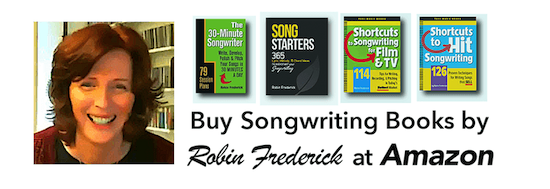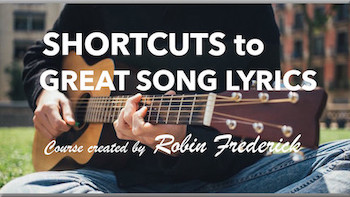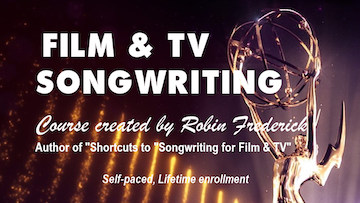Every songwriter’s dream: A total stranger stumbles across your song on YouTube, falls in love with it in the first 30 seconds, and immediately dashes over to iTunes and actually buys it. Then, your new fan sets aside an evening, turns off the phone so they won’t be disturbed, puts on headphones and curls up in a comfy chair to ponder every syllable, every note, and every nuance of the brilliant masterpiece you slaved over.
We wish. The unfortunate truth…
You manage to get your song in front of listeners any way you can. Maybe you covered a hit song in a unique way. A listener who is a fan of that song stumbled across your version on YouTube and decided to check out your other stuff. While they’re doing that, they’re half-watching a TV show, snacking on pizza while surrounded by kids, roommates, or siblings, and getting a half-dozen texts from friends. Although they may hear your song, they’re not thinking about what they hear.
That’s the harsh reality, but just remember every other song gets pretty much the same treatment. And once you know that, there is something you can do: Use trigger words.
You have to make as strong an impression as you can during the time you have with your listener without asking them for anything, not even their attention. If you can do that, they may come back and listen again… maybe in the car where the only distraction is a crazed tailgater or a whining dog in the backseat. In other words, there are always likely to be distractions. Can you create a memorable effect in spite of that? Yes, you can.
What are trigger words?
A trigger word is a word or phrase that evokes an emotional, physical, or visual reaction in the listener. It may not be something they’re aware of, but it’s there.
– Emotional
Phrases like “shining light,” “laugh with you,” and “lift me higher” are readily understood and felt as happy, positive, and uplifting. A phrase like “your lies,” “an icy look,” or “lonely days” will immediately be interpreted as sad, dark, and isolating. It’s an emotional reaction, one that the listener didn’t have to work at. It just happens.
– Physical
Phrases like “cold sweat,” “warm breeze,” or “velvet touch,” or strong action words like “drowning,” “racing,” or “stretching” can literally evoke a physical reaction in the listener. It’s small but it’s there.
– Visual
Images like “faded tattoo,” “cheap wine,” and “empty streets” can work together to create a compelling mental movie for the listener (even if it’s not exactly the story in your song). It will all depend on which words manage to make an impression.
All of this occurs without the listener making any effort. Even if your listener makes no attempt to understand your lyric, or isn’t able to focus on it, they’ll still experience the song on some level through their feelings and reactions to a few words and phrases that get through. If the song sparks some interest, they’ll come back and, hopefully, listen with more attention. When they do, your lyric will have the chance to deliver more depth and meaning.
A hit song example
To see trigger words in action, let’s take a look at a few lines of Katy Perry’s hit song “Roar.” The writers used a whole raft of words and phrases with emotional, physical, and visual associations.
VERSE 1:
I used to bite my tongue and hold my breath
Scared to rock the boat and make a mess
So I sat quietly, agreed politely
CHORUS
I got the eye of the tiger, a fighter
Dancing through the fire
‘Cause I am the champion, and you’re gonna hear me roar
Louder, louder than a lion
‘Cause I am a champion, and you’re gonna hear me roar!
This lyric is filled with vivid language that triggers feelings, images, and reactions in the listener. If listeners hear even half of these they’ll have an idea what the song is about.
“Bite my tongue,” “hold my breath,” “scared to rock the boat” “sat quietly” and “politely” are visual and physical phrases associated with self-restraint or weakness.
“Tiger,” “fighter,” “fire,” “champion,” “louder,” “lion,” and “roar” are all associated with feelings of strength.
Notice how one set of associations is used in the verse and a different set in the chorus. This song never says, “I was weak but now I’m ready to stand up for myself.” It doesn’t ask the listener to think about it, either. It uses language filled with expressive images and associations to convey the theme in a way that listeners can absorb without any effort.
Why use trigger words
MEMORABILITY: Trigger words tend to make an impression and stay in the listener’s memory longer than words that have few associations. For example, if I use the word “song” in a lyric, it would probably work fine. “Song” is a nice word, but it’s very broad. How is the listener supposed to react to it? But if I say “lullaby” instead, then I have a word with a lot more associations: innocence, family, home, childhood, trust, peaceful sleep.
Context will help to determine how the word is perceived, too. I could pair “song” with a word like “heart” which is more visual and emotional, or “fight” which is more physical. “Heart song” or “fight song” are phrases that are more likely to catch attention and stay in memory than “song” alone. So, if you have a choice, use a word or phrase that taps into more of the listener’s reactions.
COMMERCIALS: If you’re writing songs for the TV ad market, trigger words are essential. They’re a quick way to connect feelings with a product or brand. There’s no time for a story or character development in a 30-second spot. Make sure the emotional vibe of the song is clear. Underscore it with words that are associated closely with the feeling you want.
Tips for using trigger words
Sure, this is subjective. There’s no official list of words and associations you can use as a guide. But if you follow your instincts and add context, chances are you’ll find that others share similar word associations.
TIP: LIVELY UP YOUR REWRITE.
If your lyric feels a little blah, pump it up with trigger words to add life and get attention. Make a list of physical, visual, and emotional words and phrases that are associated with the feeling you want to put across. Then look through your lyric to see if you can replace abstract ideas or neutral words with the words and phrases on your list.
TIP: EMPHASIZE TRIGGER WORDS WITH YOUR MELODY.
- Consider supporting some of your trigger words with the higher or longer notes of your melody.
- Drop a loaded word at the end of a line where it can linger in the listener’s ear.
- The second line of a pair of rhyming lines always attracts extra notice. Put a trigger word or phrase there.
It’s feeling time, not thinking time
Listeners are smart people who like music. But sometimes we expect them to take us seriously before they’re ready. Give them a chance to feel your song before you ask them to think about it. Using language that speaks directly to their emotions and senses brings the song to them without asking for anything in return. Give them an experience first and they’ll come back to listen again and again, discovering more in your lyric each time they do.
Want more?
Try listening to a few recent hit songs that you aren’t familiar with. Do it when there are a lot of distractions. What was your impression of the song? What was it about? Then listen more closely and see if you were right.
Don’t stop there…
Listen to the following songs and look for words and phrases that evoke an emotion or physical reaction.
- “I Know What You Did Last Summer” (Shawn Mendes & Camila Cabello) – A tabloid style tell-all filled with suspicion, betrayal, and broken hearts.
- “Royals” (Lorde) – A description of the luxe life that somehow makes it seem terribly unappealing. How did she do that? Read my “Royals” song guide on this site to take a deeper look.
- “What a Wonderful World” (Louis Armstrong) – What images and sensations did this lyric choose in order to evoke in the listener a sense of wonder and beauty? What would you choose? Write a song with this theme.
- “Scars to Your Beautiful” – Alessia Cara
“Goin’ Home” – Dan Auerbach
“Setting the World on Fire” – Kenny Chesney feat. P!nk
Listen to your favorite songs—current hits and golden oldies— and look the for trigger words.



